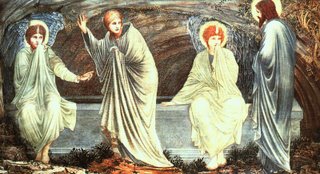*Note: In what follows I will consistently use the term
bodily in place of
physical since a focus on the physical aspect of the resurrection might lead to a false understanding of the resurrection as simply a crass rescusitation. What the NT affirms is that the resurrection was something transformative. Nevertheless, the transformation was something that the NT authors believed
happened to the physical body of Jesus. But in order to avoid the implications of the term
physical I will use
bodily in its place as a description of the nature of the resurrection.
It seems as if Michael Bird has stirred up a firestorm with his
post concerning the necessity of belief in the resurrection (bodily) as marking one to be a Christian. Ben Meyers in his reply
post , though himself holding to a bodily resurrection, disagrees with Michael and sides with Wright saying:
"On this occasion, I will have to side with N. T. Wright against Mike. I think Mike is exactly right about the centrality of resurrection in the primitive Christian kerygma. But the crucial question is whether any particular theological
interpretation of resurrection belongs to the heart of the gospel. And it seems to me that the New Testament itself resists such a view. In fact, the New Testament witnesses don’t offer any precise theological interpretation of the resurrection. None of the Gospels tries to describe or explain the event of resurrection at all—rather, the resurrection is precisely the
mystery at the centre of the story of Jesus." (emphasis Ben's)
Since I consider both to be very intelligent men and since they are two of my favorite blogs, it's unfortunate that I have to take sides on this issue. Yet take sides I must. Now Ben agrees with Mike that the resurrection was central to the primitive Christian kerygma. This is key. Where they obviously differ is in the matter of the interpretation of the event of resurrection. Ben stresses that there is no uniform theological interpretation of resurrection that the New Testament witnesses emphasize. The stress is rather on the
mystery behind the event. Ben sees in this good reason for still calling those who do not affirm a
bodily resurrection, Christians.
Now on the one hand Ben is correct to say that the New Testament documents witness to various theological interpretations of the resurrection. But on the other hand I think this diverse interpretation has to do with the
meaning of the resurrection event rather than with an interpretation of the event itself. There is a difference. On my reading of the New Testament, what is uniformly taught or implied is that Jesus' resurrection was indeed bodily. When the NT authors (particularly the Gospels) discuss Jesus' resurrection it is never with the intent to impose on it some theological understanding which denies its bodily nature. Rather, as Michael in his reply
post observed, the NT writers when treating the resurrection actually go to great lengths to restrict certain understandings of the resurrection that would deny its bodily aspect:
"The NT authors bracket out certain hermeneutical reflections on the resurrection including its denial (1 Corinthians 15), gnostics and docetic interpretations (John 21; Luke 24), and over-realized accounts (2 Tim 2.18)."
I think Mike has made an essential point here and reinforces my observation that a distinction should be made between diverse interpretations of resurrection
meaning and differing interpretations of the
nature of the resurrection event. It is the former which the NT witnesses to not the latter.
Yet this does not really answer the question that has been raised: "Is belief in the bodily resurrection necessary for one to properly be labled a Christian?" It seems to me the reason that we are running into a problem is due to some of our terms, particularly the label, "Christian." We need to remember that this term is anachronistic when speaking of the primitive community. It does not occur anywhere in the NT except for briefly in Acts 11:19-30. In the context of the passage it is suggested that the term is a label placed upon the community externally. This is confirmed by the fact that it is not used throughout the rest of Acts (nor anywhere else). The term that is applied consistently in the NT to the primitive community is "believers." This phrase appears in Paul (1 Cor 6:5, Gal 6:10), James (2.1), and especially in the book of Acts (Acts 1:15, 2:42, 44, 9:41). Why am I stressing this fact? Because to become a part of the 'ekklesia' you had to become a believer. The question then is, "a believer
of or
in what?" The simple answer is belief in the 'gospel.' However, the answer is not so simple anymore since the word 'gospel' has been loaded down with theological excess (incarnation, trinity,etc).
The proclamation uttered by the early assembly (ekklesia) was that the man Jesus who had been crucified was
raised from the dead by God. He was now Lord and was exalted at God's right hand. It was by
believing in this 'good news' (euangelion) that one was thereby incoporated into the community. The good news had content, and that content centered around the proclamation that God had raised this man from the dead and placed him in a position of authority. Furthermore, this proclamation 'God raised Jesus from the dead' would have been understood as
bodily. There are three, I believe, decisive indications of this:
1.) The first point has already been made, namely, that the New Testament is uniform as to its interpretation of the event being bodily, even in the cases where discontinuity is emphasized.
2.) Secondly, the major contribution of N. T. Wright's
The Resurrection of the Son of God was in exhibiting that when the noun and verb forms of
anastasis and
egeiro were used by both supporters and opposers in the Second-Temple Judaic period the referent was always concrete and was something that happened to the
body. Other interpretations and/or definitions Wright, rightly dismissed:
"Nothing in the entire Jewish context warrants the suggestion that the discussion in 1 Corinthians 15 was about'resurrection in heaven', or that the Jewish literature of the period 'speaks both of a resurrection of the body and a resurrection of the spirit without the body'. Some Jews speak of eternal disembodied bliss, but this is not described as 'resurrection'; when resurrection is spoken of, it is the second stage in post-mortem life, not the instant destiny upon death. Nothing here, either, would prepare us for the use of 'resurrection' to mean 'that after his crucifixion...Jesus entered into the powerful life of God' or 'the passage of the human Jesus into the power of God'." (204)
3.) Thirdly, juxtaposed with the proclamation that God had raised Jesus from the dead, was that Jesus had previously been crucified and so had died (cf Acts 2:23ff, 1 Cor15:3ff). If, in their proclamation of the gospel, the early believers intended for the audience to understand Jesus' death as literal and so bodily then when they claimed God raised him from the dead, the same meaning would have been intended, that is, that God had
bodily raised Jesus from the dead.
Given these three observations, I fail to see how the early community's proclamation would not have been understood as involving the bodily resurrection of Jesus.
Lastly, if this is how the resurrection event was meant to be understood, as something that happened to Jesus' physical body, then Paul's assertion in Rom. 10:9 carries all the more weight in this debate. Paul, who some scholars see echoing an early baptismal formula, declares that to be saved one need only to "confess Jesus as Lord" and to "believe in their heart that God raised him from the dead." These two assertions, as I stated in my previous post, are integral to one another and form a symbiotic relationship. The believer can confess
Jesus as Lord
because God raised him from the dead. If you excise the resurrection, by default you excise the Lordship of Jesus.
In the end, I must cast my lot with Michael. If the early community was defined by its belief in the gospel and if the content of that gospel included the bodily resurrection of Jesus then I fail to see how I can properly call someone a believer who does not
believe in that message which included Jesus'
bodily resurrection from the dead.












